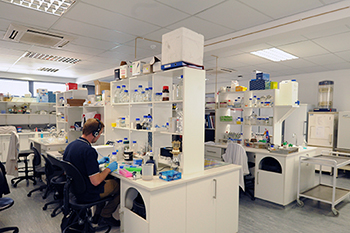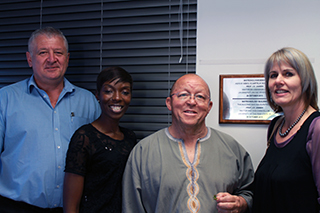Latest News Archive
Please select Category, Year, and then Month to display items
14 June 2024
|
Story Anthony Mthembu
|
Photo Suplied
 Jeremiah Hlahla, a UFS student completing his PhD in Botany at the University of Debrecen as part of an exchange initiative funded by the Erasmus+ Mobility Programme.
Jeremiah Hlahla, a UFS student completing his PhD in Botany at the University of Debrecen as part of an exchange initiative funded by the Erasmus+ Mobility Programme.
As part of an exchange initiative facilitated by the Erasmus+ Mobility Programme, Jeremiah Hlahla, a student at the University of the Free State (UFS), is nearing the completion of his PhD studies at the University of Debrecen in Hungary. Hlahla’s journey, which began in February 2024 and is set to conclude in July 2024, has been a remarkable learning opportunity. “As a first time-traveller to Europe, I have thoroughly enjoyed engaging with people from different countries and cultures,” he said.
The benefits of international collaboration
Hlahla is currently pursuing a PhD in Botany, focusing on plant stress physiology. “My current PhD project investigates the physiological, biochemical and morphological responses of vegetable-type soybean, or edamame, to combined drought and heat stress,’’ he explained. He considers the University of Debrecen the ideal institution to complete his research due to its extensive expertise and resources in similar projects. He noted that his colleagues at Debrecen conduct significant work on plant protection against biotic and abiotic stresses, including salt and drought stress, as well as proteins and amino acids in barley and other legumes.
Given the vast knowledge available on similar projects, Hlahla has found substantial engagement with his work at the University of Debrecen. “Upon arrival, I delivered an introductory lecture presenting my UFS project on the synergistic effects of combined drought and heat stress on the physiology and biochemistry of edamame. It was an engaging session as everyone could relate to my work and asked many questions,’’ he said.
Insights gained from the exchange
Hlahla has also gained valuable lessons that will assist him in his research career, including biotechnology and physiology tools. “I learned how to prepare samples and use high-performance liquid chromatography (HPLC) and reversed-phase ultra-high-performance liquid chromatography (UHPLC) to quantify proteins and amino acids,’’ he said. These techniques are beneficial not only for his current work but will also support future soybean research.
As his experience at the University of Debrecen nears its end, Hlahla reflects on the collaborations and friendships he has formed, which stand out as a significant highlight.
UFS launches expansions to Biotechnology Building
2015-11-04
 Biotechnology Building
Photo: Leonie Bolleurs |
To support the strategic focus of the University of the Free State (UFS) on teaching and learning in the field of Biotechnology, the Department of Microbial, Biochemical, and Food Biotechnology introduced upgrades and additions to the value of R23 million to the existing Biotechnology Building on its Bloemfontein Campus. The funding was provided by the Department of Higher Education and Training.
The new section, together with renovations to the existing part of the Biotechnology Building, was opened on Thursday 29 October 2015.
The Department, consisting of three disciplines - Microbiology, Biochemistry, and Food Biotechnology - is extremely diverse. Two of the three disciplines – Microbiology and Biochemistry – are housed in the Biotechnology Building.
Additions and renovations to the Biotechnology Building include:
- Four new research laboratories
- Nine revamped research laboratories
 At the launch of the Biotechnology Building were,
from the left: Nico Janse van Rensburg,
Senior Director: University Estates;
Maureen Khati, University Estates,
Prof Nicky Morgan, Vice Rector: Operations
and Ria Deysel, Director: Facilities Management.
Photo: Leonie Bolleurs
|
The work to the building will have dramatic effects on the quality, as well as the quantity, of postgraduate students. Given the national priority to deliver students, this is very important, particularly at the doctorate level.
Prof Koos Albertyn from the Department said these were the first renovations and expansions done to the building since 1 January 1990. “We welcome the extra space. Forty-six more postgraduate students can now be accommodated in the department,” he said.
Construction took place on the south-western corner of the existing building. Further developments to the building include:
- Six new offices
- A lecture hall for 70 students
- Laboratories that can accommodate 56 postgraduate students
Prof Martie Smit, Academic Head of the Department, said: “This new and refurbished facility enables us to give our best. As academics, we are committed to doing our part in delivering high-quality education at both undergraduate and postgraduate levels to students envisaging a future in biotechnology.”
The James Charles du Preez Seminar Room was also opened at the event. The seminar room is dedicated to Prof Du Preez – who was Head of the Department from October 2002 until the end of 2014. He played a major role in raising funds for upgrading the Biotechnology Building, including the addition of a new wing.